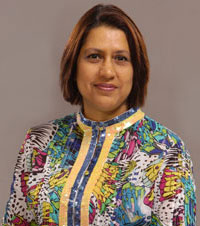|
 Bapsy
Jain worked for ten years on her debut
novel, Blind Pilgrim. What took so long? “I
am not a writer,” she says. “I’m a thinker,
but I’m compelled to write.” Why? “I don’t
know. I have the opportunity to do these
things.” Part of Bapsy’s writing story was
her commitment to get the novel right. “I
had offers to publish sooner, but I was not
confident that the book lived up to its
potential.” To that end she made numerous
revisions. “I wanted a story that would make
people think. That’s a tall order.” Bapsy
Jain worked for ten years on her debut
novel, Blind Pilgrim. What took so long? “I
am not a writer,” she says. “I’m a thinker,
but I’m compelled to write.” Why? “I don’t
know. I have the opportunity to do these
things.” Part of Bapsy’s writing story was
her commitment to get the novel right. “I
had offers to publish sooner, but I was not
confident that the book lived up to its
potential.” To that end she made numerous
revisions. “I wanted a story that would make
people think. That’s a tall order.”
Blind Pilgrim’s now Lucky Everyday’s
acceptance itself was a unique story. “The
Penguin editor happened to be in Bombay, and
one of my friends gave her a copy. She
picked it up on the way to the airport and
read it on the plane. She called from the
airport in Delhi and said, “We’ll take it.”
Bapsy laughs. “It must be one of the fastest
acceptances in publishing history. And
Penguin was very good to me,” she says.
“Especially Mike Bryan, their CEO. They have
been very professional and helpful all
along.”
Penguin USA acquired the book this past
March, and subsequently it will be published
world wide by Penguin. Meanwhile, Blind
Pilgrim is a best seller in India. After
only a month on the shelf it went into a
second printing. Bapsy says, “I like that
people are reading my book, and I want my
message to get across. I like that it talks
to so many different people: Mothers and
wives and men, even men in prison. We all
face difficulties. This is a book about
hope, growth, and having faith in one’s self
in the face of adversity.”
Was her quest for excellence successful? Her
emails tell her that people like the story,
though not everybody grasps the depth of its
philosophy, though some do. One read, ‘After
reading your book, I look at everything
differently.’ All agree that the book is a
fast an entertaining read.
In brief, Lucky Everyday tells the story of
Lucky Boyce, a young, London-educated Indian
woman working in New York, who is swept off
her feet and into a world of trouble when
she falls in love with Vikram Singh, only
son of a wealthy Mumbai family. When the
marriage fails she returns to New York,
where she volunteers to teach yoga to prison
inmates. She finds a job with an old
business associate, but here the story takes
a surprising (and vicious) twist - which I
am sworn not to reveal. But any sense that
this is a light romance ought to be dashed
as the novel turns serious. “One does not
choose this kind of life,” one of the
characters says to Lucky, “this kind of life
chooses you.”
Where did all of this imagination come from?
Well, there are certain biographical
similarities. Like Lucky, Bapsy is a
chartered accountant, and like Lucky, she
was educated in London, but there the
likeness ends. Bapsy says, “Writing a book
is not about the author. It takes on an
identity of its own. The author is just an
instrument. We are commentators on life.
I write by thinking: What if I hadn’t been
so lucky? What if these things happened to
me? I have been very fortunate in life, but
it doesn’t mean that I don’t think about
people who aren’t. I worry about people. I
care about their difficulties. I grew
writing this book. I grew in courage, not
only by writing and putting myself out there
as a writer, but because I put so much into
Lucky. I never want to go through as much as
she goes through in real life. I took on her
troubles, in a way, and faced up to them
myself.”
Bapsy laughs when asked whether success has
spoiled her. “Lots of my friends don’t know
that I have written a book,” she says. “Jain
is a common name, and I don’t talk about it
much. I want people to read the book because
they are curious about the book, not because
they are curious about me.” For the record,
Penguin has taken rights on a sequel, so we
are sure to be delighted by more works from
Bapsy in the future. |